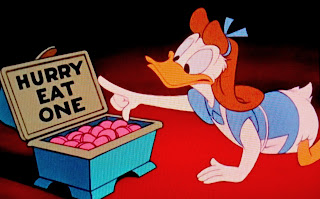 |
| Pent-up Duck |
I was actually surprised that this short-subject feature was shown theatrically; I’d always assumed it was made primarily for distribution to schools through special education channels, or maybe shown on television first (it was later shown on TV in 1961, as part of NBC’s premier episode of The Wonderful World Of Color.) It does seem like an odd choice to show before a light-hearted Irish fantasy film, which I also didn’t think was so short that it necessitated an extended-length short in front of it (although 93 min + 27 min = 120 min … oh, never mind.) But nevertheless, there it was, and so here we are reviewing a grade-school video standby which by this point is only of interest to math geeks and Disney nerds (or vice versa.)
Right off the bat, we get Donald Duck (voiced by the always great Clarence Nash,) apparently out hunting(?) and wandering into the “mighty strange” world of Mathmagic. He's soon joined by the familiar voice of Paul Frees as the “True Spirit of Adventure” (AKA the narrator,) basically doing his baritone Adventure Thru Inner Space voice. Soon we (and Donald) are whisked to Ancient Greece, since the narrator seems to think that discussing ancient history will convince everyone that math is not just for “eggheads.” It seems to work, though, as learning about the mathematics of octaves soon has the angry bird himself leading the Pythagoreans in a soft-jazz jam session.
There is a stretch in the middle of the film where we are shown how the Greek’s obsession with the ratio of the “golden section” influenced their art and architecture, and how this and the deduction of the “golden rectangle” continue to inspire into the modern era. Honestly, there's only so long that rectangles and triangles superimposed over pictures of buildings and paintings can keep one’s interest. This is followed by a sequence explaining how math is the basis behind the rules for most games and sports. Somehow Donald ends up dressed like Alice in order to demonstrate the mathematical dialect behind chess – though it does get us the beauty of a line, “I’m no pawn – I’m Donald Duck!”
 |
| Donald doesn't pull it off quite as well as Bugs Bunny |
This soon brings us to an extremely long sequence where the mathematics behind billiards are demonstrated by a live player – over … and over … and over … and over again. Yes, playing billiards and pool is all about the utilization of angles – no shit. I’m not sure this section really gets its point across, unless the point was to make kids want to go play pool. Perhaps Disney was trying to inspire a new generation of hustlers?
I may sound like I hate this feature, but I honestly don’t – you just have to admit it’s all pretty silly. I don’t know how much a Donald Duck cartoon would necessarily change the mind of any child (or adult, for that matter) who is predisposed to dislike the subject of math - but that they even try is admirable. Disney has received a lot of flak in the past for trying to branch out from pure entertainment into the world of education. I feel that when framed in an entertaining manner (again I’ll invoke the specter of EPCOT Center and bring up the phrase “edutainment,”) kids will respond receptively to new ideas. Toward the end of Donald In Mathmagic Land, the narrator peeks into Donald’s cluttered mind, and encourages him to do some “mental house cleaning” to rid himself of antiquated ideas, bungling, false concepts, superstitions and confusion – and maybe that’s the whole point.
 |
| A look inside the Trump White House |
At its best, I think that many of Disney’s efforts – EPCOT Center included – were never to try and educate (or, for cynics, indoctrinate) people like a corporatized school lesson, but rather to plant the seeds of interest. Those with more inquiring minds may then choose to think and learn more about a diverse array of subjects later on.
I’ll finish this review off, as the short itself did, with a quote from Galileo: La mathematica ė l’ alfabeto nel quale Dio ha scritto l’ univerlo.
Now I have to go pay my wife – I lost a bet on how long it would take me to bring up EPCOT Center.
No comments:
Post a Comment